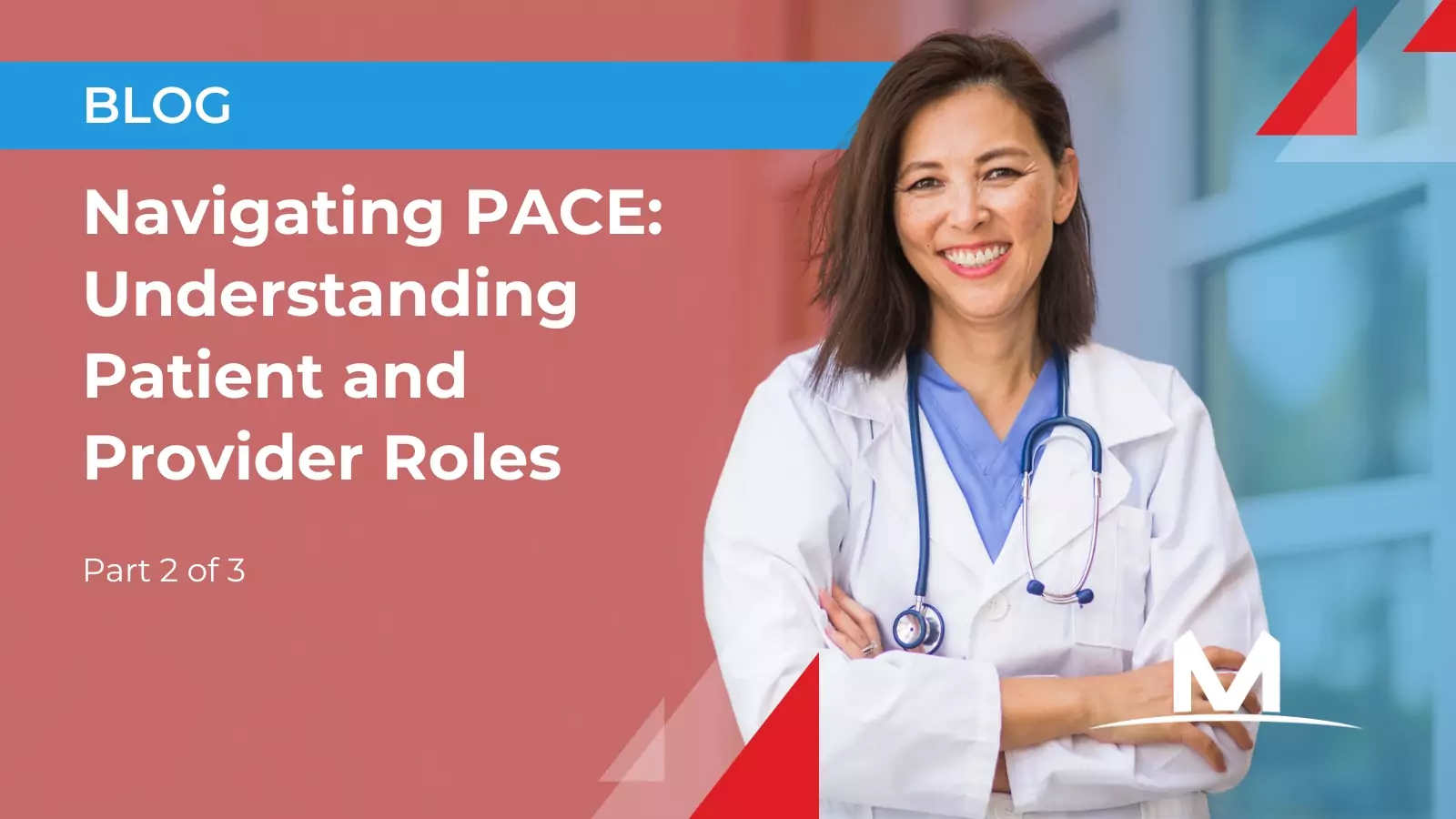Navigating PACE: Understanding Patient and Provider Roles

Author: Shea Swenson
Posted: September 3, 2024
Discover Your Agency's Full Potential [Schedule an Assessment]
As outlined in part one of our PACE blog series, The Program of All-Inclusive Care for the Elderly (PACE) offers comprehensive medical care and social services tailored to seniors who wish to maintain independent in their homes. Below, we delve into the qualifications for enrollment, the intricate procedures involved in administering PACE, and the crucial responsibilities of providers in delivering high-quality, personalized care to participants, ensuring their health and well-being are prioritized and supported.
The People of PACE
As mentioned in the previous PACE article, qualifications to enroll in the program include:
- Age 55 years or older
- Live in a PACE service area
- Be certified by the state as needing nursing home-level care
- Must be able to safely live in the community with the help of PACE.1
However, there are some restrictions to those eligible, including:
- Cannot be enrolled in Medicare Advantage (Part C) Plan
- On a Medicare prepayment plan
- On a Medicare prescription drug plan
- Enrolled in hospice services1
How to Enroll:
Eligible individuals must first meet the qualifications above, voluntarily enroll, sign an enrollment agreement, and provide necessary medical and personal information. This ensures that the provided care team can meet the individuals’ needs and determine what services will need to be provided.1 Enrollment is continuous, unless participants choose to disenroll or are dropped from the program.
Benefits of PACE:
The PACE program has countless benefits for eligible enrollees including, but not limited to all Medicaid and Medicare covered services, such as:
- Adult care
- Emergency services
- Home care
- Hospital care
- Nursing home care
- Physical therapy
- Prescription drugs
- Primary care
- Social services
- Transportation
- Other services covered by Medicare and Medicaid2
The Role Providers Play in PACE
PACE providers are an integral part of ensuring the program provides the necessary care for every individual who needs the support. The wide range of different medical and social service providers must work together to ensure that the best quality care is performed, compliance is met, and patients and their families are supported during difficult times. Learning how to administer the program, operate as a team, and understand the qualifications and guidelines will be essential for a smooth transition.
How to administer a PACE organization:
PACE organizations can be non-profit, private or public entities that deliver PACE services. Their goal is to help you live in the community for as long as possible, which requires a large focus on preventative care. With the help of PACE organizations, many of their patients meet this goal with only 7% living in nursing homes.3
Qualifications:
- Community representation through a governing board
- Physical site to provide adult day services
- Defined service area
- Capability to provide all necessary services
- Safeguards against conflict of interest
- Proven fiscal soundness 2
Roles and Responsibilities:
Since PACE is a provider-sponsored health plan, your doctor and other providers also work with you to make decisions about your care.3 A PACE team can consist of a primary care physician, nurses, social workers, therapists, dietitians, etc. These teams collaborate to create individualized care plans, ensuring comprehensive and coordinated support for each participant.
Effective Administration Strategies:
Comprehensive Assessments: Conduct initial and periodic health assessments to tailor care plans.
Care Coordination: Facilitate communication among care team members and external providers.
Resource Allocation: Ensure availability and efficient use of resources to meet participants' needs.
Quality Assurance: Monitor and evaluate care quality, implementing improvements as needed.
Regulatory Compliance: Adhere to state and federal regulations governing PACE programs.
By adhering to these guidelines, PACE organizations ensure that elderly participants receive comprehensive, high-quality care in their communities.
The MHA Difference – Strategic Solutions
MHA experts are here to help home health and hospice agencies adapt and grow in the ever-changing environment of the post-acute care industry. Whether that be through strategic alignment, tech implementation, or keeping you updated on regulation changes or new advancements. Follow along with our three-part PACE blog to further understand how the program works, patient and provider roles, and how MHA can help your agency. If you would like to learn more about any of our transformative tools or are ready to take your agency’s strategy to the next level, contact us at [email protected] or visit www.maxwellhca.com.
Resources:
-
Healthline. "PACE and Medicare: What to Know." Accessed August 23, 2024. https://www.healthline.com/health/medicare/pace-medicare#eligibility.
-
Centers for Medicare & Medicaid Services. "Programs of All-Inclusive Care for the Elderly Benefits." Medicaid. Accessed August 23, 2024. https://www.medicaid.gov/medicaid/long-term-services-supports/pace/programs-all-inclusive-care-elderly-benefits/index.html.
-
Centers for Medicare & Medicaid Services. "PACE Fact Sheet." CMS.gov. Accessed August 23, 2024. https://www.cms.gov/Medicare/Health-Plans/PACE/Downloads/externalfactsheet.pdf.

